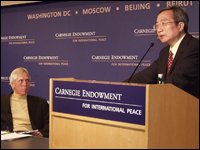Registration
You will receive an email confirming your registration.
Carnegie’s William Chandler and Zhou Dadi discussed how to break the U.S.-China “suicide pact” of self-destructive, energy-using behavior during a May 8, 2008 event at the Carnegie Endowment. They suggest U.S.-China climate and energy cooperation as a critical step toward a global climate agreement. China and the U.S. must work together to define tangible, credible implementation mechanisms, while also working toward a global climate agreement. The event was moderated by Carnegie president Jessica T. Mathews.
Chandler emphasized the potential of demand-side energy options in both China and the United States. The technology required to improve energy efficiency is available, but unexpected barriers – including confiscatory tax policy and industrial policy that discourages financing to energy-intensive sectors – stymie its implementation. Zhou highlighted the Chinese commitment to reducing China’s rate of emissions growth. China is on track to reach its commitments of a 20 percent reduction in energy intensity and 10 percent increase in renewable energy by 2010, and is working toward a less energy-intensive model of development.
During a question and answer session, Zhou and Chandler address the capacity gap between the Chinese central government and provincial governments, the possibility of setting sectoral emissions targets in an international climate agreement, demand-side energy policy and suggestions to the next U.S. president on breaking the U.S.-China suicide pact. The two countries must work together to demonstrate real progress toward those goals. Carnegie’s project on U.S.-China Climate Cooperation works to facilitate discussion among high-level officials from both countries to shape the policy process. It builds teams that provide resources to provincial leaders to effect real progress on the ground.
